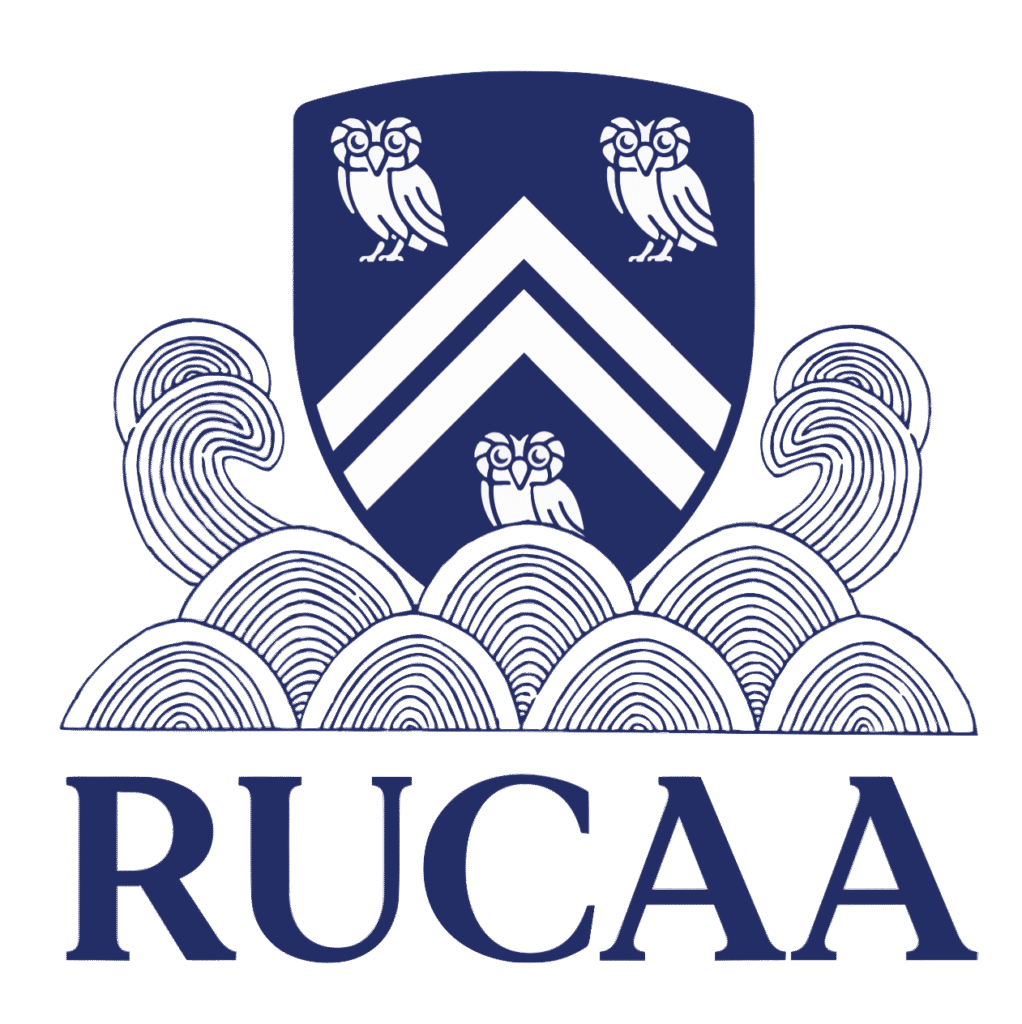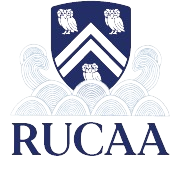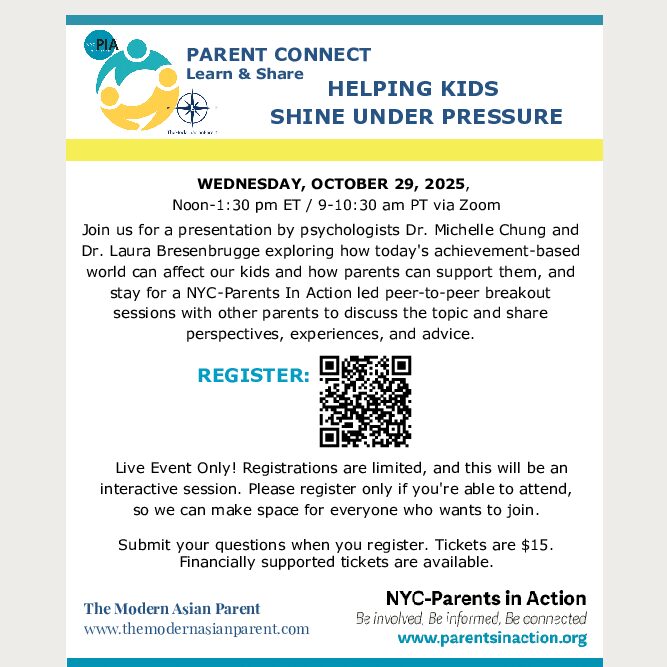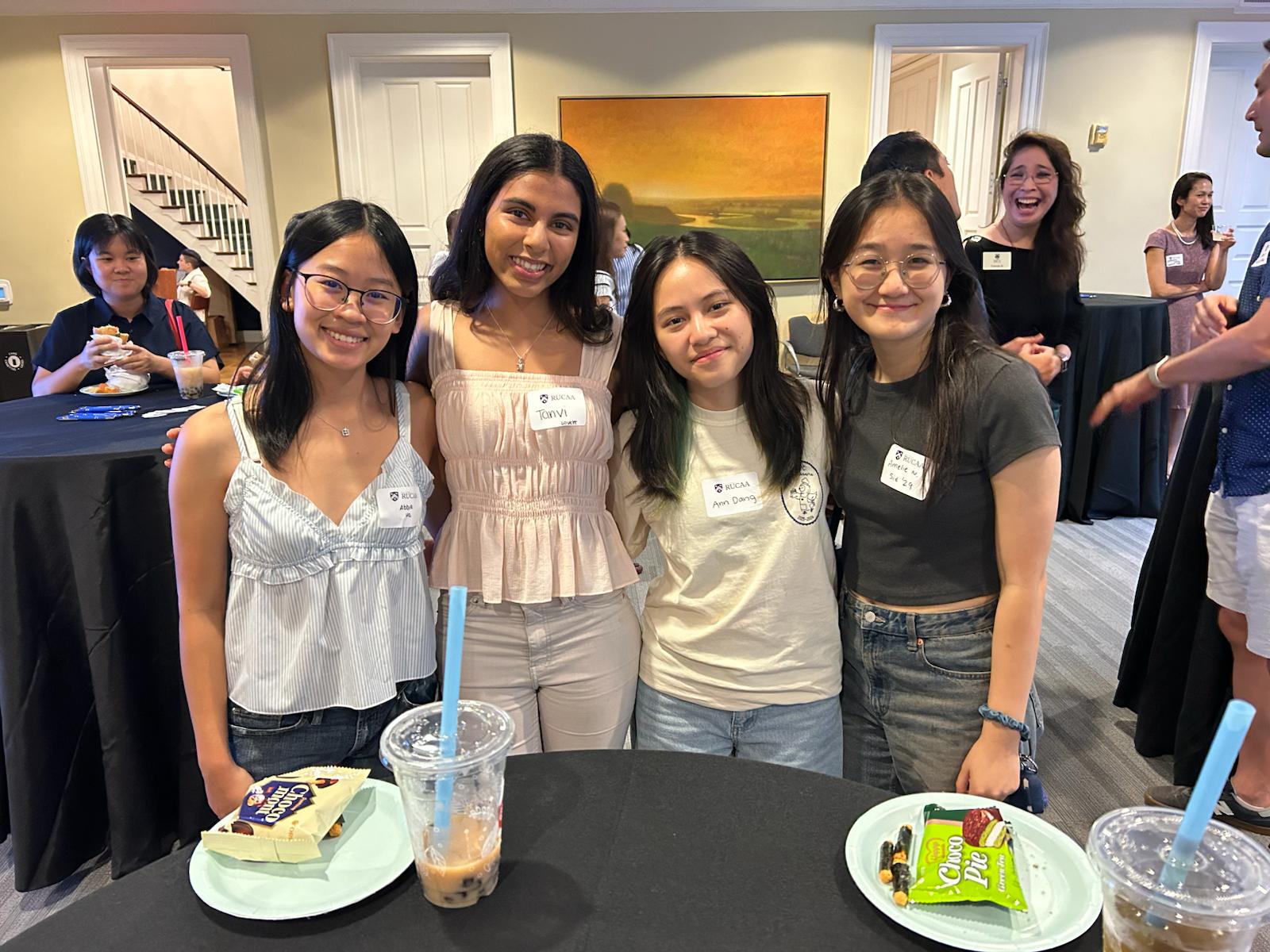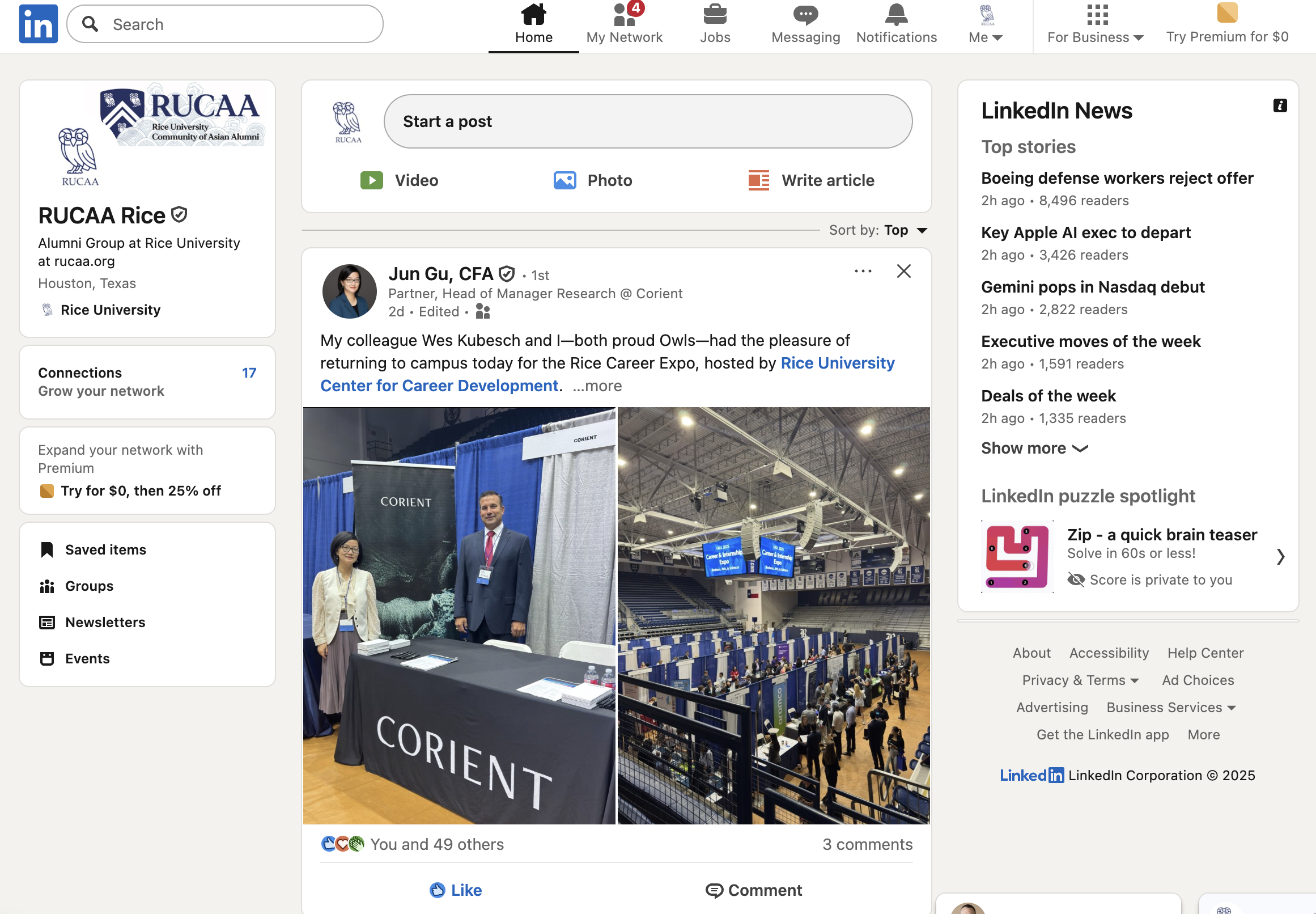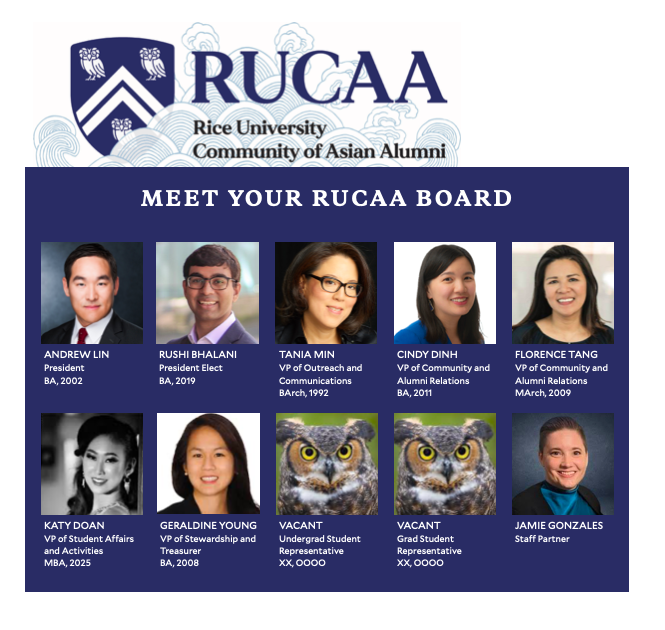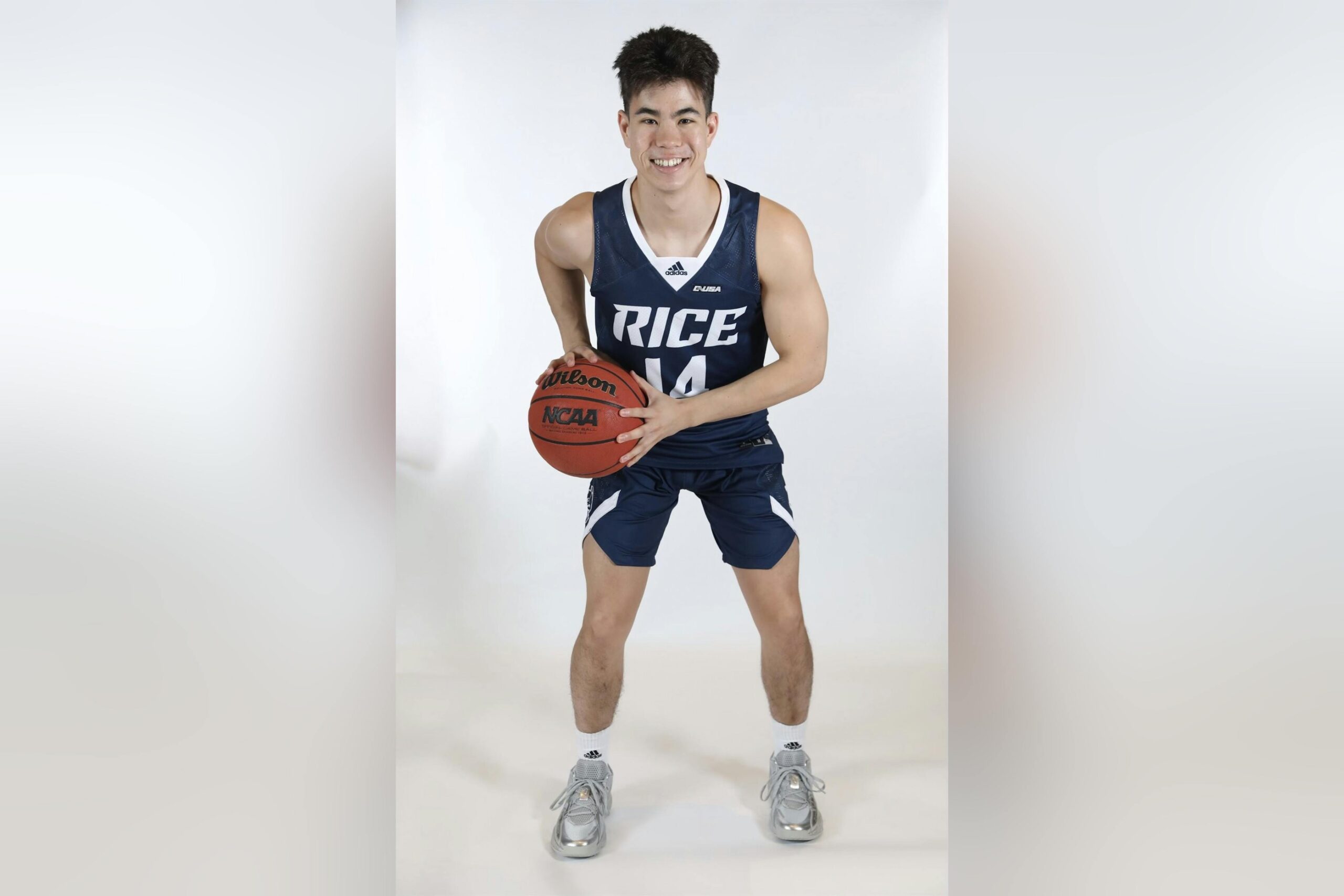Note: This webinar and PIA is not affiliated with Rice University or RUCAA Modern Asian Parent Partnership presents: HELPING KIDS SHINE UNDER PRESSURE WEDNESDAY, OCTOBER 29, 2025, Noon-1:30 pm ET / 9-10:30 am PT via Zoom Join us for a presentation by psychologists Dr. Michelle Chung and Dr. Laura Bresenbrugge exploring how today’s achievement-based world can affect our kids and how parents can support them, and stay for a NYC-Parents In Action led peer-to-peer breakout sessions with other parents to discuss the topic and share perspectives, experiences, and advice. Live Event Only! Registrations are limited, and this will be an interactive session. Please register only if you’re able to attend, so we can make space for everyone who wants to join.
2025 RUCAA Students Welcome Recap
Thank you to all students and alumni who came out for the RUCAA Students Welcome on October 8th, 2025 at Huff House. The RUCAA community, ranging from first years to venerable alumni, was revitalized over an evening of shared stories and connections. Special thanks to our ARA Board members who were able to join us. Highlights included alumni sharing lessons and career advice and students joining in small-group conversations in addition to the boba, mint lemonade, ube coffee bites, lemon sandwich biscuits, angel wafers, nori make arare, wasabi peas, choco pies, pocky, bánh mi, and pondicheri shortbread. A huge thank you to Jamie G., our Alumni Relations staff partner and Rice Housing and Dining. Thank you to our RUCAA Board, volunteers, alumni and students who brought such enthusiasm. You make this community truly special.
Rushi Bhalani, 2025 Builders Awards Recipient and RUCAA Leader
About the Builders Award: Established by the Association of Rice Alumni in 2005, the Builders Award honors recent alumni who have made outstanding contributions to Rice since graduation. Past winners include notable regional alumni leaders, Annual Fund volunteers, affinity group trailblazers and other recent alumni who are committed to supporting Rice and its community of students and alumni through their dedication of time, talent and energy. Each has demonstrated one or more of the following: Meet our RUCAA Winner, Rushi Bhalani! A proud Bakerite, Rushi Bhalani graduated from Rice in 2019 with a degree in computer science and has remained deeply engaged with the university community. Guided by a belief in building up others through connection and care, he has served on three alumni boards — the Rice Engineering Alumni (REA) Board of Directors, the Association of Rice Alumni (ARA) Board of Directors and the Center for Career Development (CCD) Advisory Board. In these roles, he has helped lead efforts such as raising more than $200,000 through data-driven outreach, launching a summer internship program that has provided dozens of engineering students with their first professional experiences under alumni mentors, and strengthening support for recent graduates. Rushi is currently serving as President Elect of RUCCA, the Rice University Community of Asian Alumni. Beyond board service, Rushi has volunteered as a Baker College community associate, admissions interviewer, ARA Young Alumni Ambassador, Rice Fund volunteer and mentor to more than 20 students during and after their time at Rice. Professionally, he has worked as a strategy consultant at Accenture and led go-to-market strategy for a billion-dollar platform at Indeed. He is currently pursuing an MBA and an MS in Design Innovation through the MMM program at Northwestern University’s Kellogg School of Management, preparing to design mission-driven, human-centered product experiences. Congratulations Rushi! We are so proud of you!
RUCAA x LinkedIn
Get Ready for RUCAA x LinkedIn We’re on LinkedIn! It’s where to find fellow RUCAA members and share what you’ve been up to. We’ll be waiting!
Meet the New RUCAA Board Members
Introducing RUCAA’s 2025–2026 Leadership Team RUCAA is proud to announce its new board members for the 2025–2026 term — a passionate group of alumni ready to steer the community into its next chapter. President: Andrew Lin BA 2002 Term ends in 2026 President Elect: Rushi Bhalani BA 2019 Term ends in 2026 VP of Outreach and Communications: Tania Min BA/BArch 1990/92 Term ends in 2026 VP of Community and Alumni Relations: Cindy Dinh BA 2011 and Florence Tang MArch 2009 Term ends in 2027 VP of Student Affairs: Katy Doan MBA 2025 Term ends in 2027 Treasurer: Geraldine Young BA 2008 Term ends in 2027 UG Student Liaison: Vacant Grad Student Liaison: Vacant
Reed Myers Thresher Article
Reed Myers on his experiences as an Asian American athlete, republished from The Thresher By Reed Myers April 18, 2023, 9:26 p.m. The road to being a Division I basketball player is hard. It is even harder when you are an Asian-American. According to the most recent data from the 2019-2020 NCAA basketball season, players of Asian descent make up 0.4% of Division I Men’s basketball players. But growing up, that number never even came into my mind for a second. I just wanted to hoop. I have always loved the game of basketball. I grew up watching my two older sisters play basketball, and I would go to all of their practices and games, wanting to be just like them. So it didn’t take long before I had a ball in my hand. It’s kind of funny because my siblings and I grew up with parents who didn’t really have an athletic background. My dad is from Kansas City, and my mom was born and raised in Tokyo, Japan, before coming to the States before high school. Neither of them were star athletes by any means, and their professional careers strayed far away from the world of sports. But when they had my sisters and me, they had us in sports at a very young age. And for that, I consider myself lucky because while my dad is white, my mom is Japanese, and a household centered around sports was not common where she grew up. She let her kids follow their passion for basketball, and I can’t thank my parents enough for that. Basketball was always my favorite thing growing up. Because of this obsession, I turned into a pretty good basketball player in Arizona, where I ended up playing against some future NBA players. No matter what was on my mind, or what I was going through, basketball was always there for me. I was a relatively quiet kid, but basketball brought out a different side of me when I was on the court. It was my happy place. It wasn’t until I got to high school that things started to change. In my first week of high school, I remember a fellow student asking if I was a foreign exchange student. I remember embarrassingly muttering something like, “Nah, I grew up just down the street.” I quickly forgot about that encounter because I was still just trying to adjust to high school. But it wouldn’t be long before how I looked also affected what I loved doing, playing basketball. I was one of two freshmen to make my high school’s varsity team. We ended up winning the state championship that year, and I was named Small School Player of the Year by the local newspaper. But with those highs came the lows. I remember having opposing student sections ask me, “Did you make your shoes before the game?” I remember running into the locker room at halftime on the road with opposing students yelling “chink” at me. I remember telling the school’s staff members about the incident. But what I remember most is what happened afterward: nothing. I would speak up against what was happening, but nothing would change. It was then, as a freshman in high school, that I learned the brutal reality of what it is like to be an Asian-American hooper. No matter the player that I was, nor the achievements I earned, what would stick out most to people was the way that I looked. I didn’t look the part. I remember in high school reading basketball scouts describing me as “not quick” and “lacking speed,” while these scouts had never even watched me play. They had just seen what I looked like. While I do not have any evidence to back up this opinion, I truly believe that how I looked affected how schools recruited me. Even though I was a two-time state champion, scored over 1,000 points in high school and scored over 20 points on countless shoe-sponsored club teams, I couldn’t even get Division III coaches to call me back. Even when I would outperform players in my same position, they were the ones who got the scholarship offers, not me. It always felt like I had to work ten times harder than the average player my age to earn the same respect. I eventually found a place to play collegiate basketball at Rice, but I was reminded again that as an Asian-American hooper, you don’t look the part. When I would tell fellow students that I’m on the basketball team, the most common response was, “oh, you’re on the club team?” When I would respond that I’m on the varsity team, it would usually be followed by an incredulous look and ‘really?!’ being said about two or three times. During my career at Rice, I remember seeing all the teams we played against, and it became obvious that I was one of the only players of Asian descent at the Division I level. It’s honestly a crazy feeling going into opposing arenas for four years and never seeing anyone that looks like you out there on the court. One of the most difficult things for me has been that no one knows what the experience is like. It’s like you’re isolated in your own world. I can’t relate or connect with anyone who is going through or has gone through what I have been through because there is no one else. Because you are one of the only ones in basketball, people don’t really know how to treat you or what to say to you. As a result, I have been called a chink, been told I’ve eaten too many dumplings and to open my eyes and make a shot. But at the end of the day, I don’t think these things were said out of hate. I believe that because I was in a sport where I didn’t look the part, people didn’t know how to
Rice VSA, 50 years of Vietnamese America
Rice VSA Alumni, 50 years of Vietnamese America Rice VSA and Rice VSA Alumni came together on April 16, 2025, for an evening of community, food, and meaningful dialogue. Over boba and bánh mì, attendees connected across generations and reflected on the lasting impact of the Vietnam War on Vietnamese American identity. Panelists Cindy Dinh (McMurtry ’11), Rick Ngo (Lovett ’94), and Florence Tang (Rice M.Arch ’09), in conversation moderated by Thu Nguyen (Wiess ’17), shared personal stories and insights that sparked thoughtful discussion among students and alumni alike. The event not only deepened understanding of shared history but also strengthened bonds within the Rice Vietnamese community, creating new opportunities for mentorship, collaboration, and continued dialogue.
